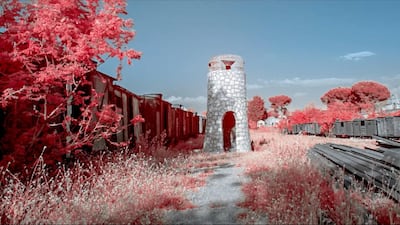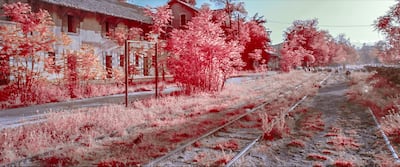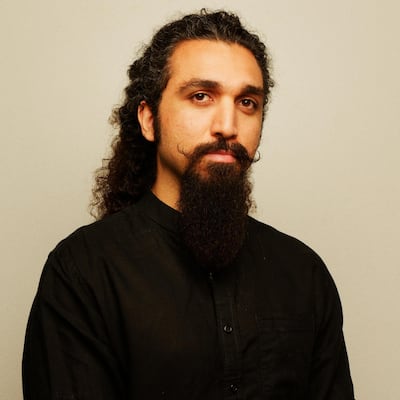Growing up in east Beirut in the 1990s, Elie Kamal was encouraged by his parents to play on the train tracks. "For someone who hears 'Go play on the railway', who has a functioning railway in their country, that will feel so dangerous," the director says.
His debut feature film, Beirut Terminus, which had its premiere in the Horizons of Arab Cinema section of the 41st Cairo International Film Festival this week, shows why loitering on the lines was not as shocking as it sounds. "In Lebanon, we don't have a lot of parks or public spaces," says the director, 34. But there are lots of disused railway stations and tracks.
“Because they still belong to the state, no one was allowed to build on them. They have been left alone, and over time have become overgrown and turned into fields. So they are safe places for children to play.”
As Kamal grew out of messing about on the tracks, he began looking into the history of the railway system in Lebanon and how this state of disrepair came to be. His essay film, Beirut Terminus, which received production support from the Enjaaz fund at Dubai Film Market, posits that the rise and fall of the railways is a metaphor for the country.
Kamal went to film school in Beirut and then in Belgium, where he honed his cinematography skills. He is the film's director, cameraman and editor. For six years, he has shot the deserted train stations in an attempt to analyse, question and understand the history of his homeland, from its creation following the collapse of the Ottoman Empire to the protests of the present day. The images Kamal documents of abandoned locomotives and animals grazing where there once stood stations are beautiful – each frame could be hung in a gallery – and are the backbone of this artistic movie.
The pictures are given context by the director's narration, in which he muses over his life and relationship with the divided country. It's all contextualised by texts delivering a history of the nation, most notably of who invaded and when. The first railway in what is now Lebanon opened in 1895 during the Ottoman era, linking Beirut to Damascus. In later years, lines opened to Aleppo and Tripoli. It was the golden age of the railway.

In the Second World War, the Allies extended one line to Palestine. But it was quickly closed down after the 1948 war. The new Lebanese government took control of the railways, and it suffered from a lack of investment. The Civil War accelerated the network's decline, and the railway was abandoned. The last route to remain open, carrying cement materials from Beirut to Chekka, closed in 1997. "The railway now looks like a skeleton, a body left to rot," argues Kamal. "It's a corpse. And if you don't pump blood into the veins, eventually it dies."
Today, the tracks that remain divide the city. "The line is not used to join people from different places together, but as a separation," Kamal says. "You cannot cross from one region to another, and that was really problematic for someone like me. I opened my eyes, and then there was a civil war, and then for no reason that I could understand, I could not cross from one side to another because you are from a different religion."
The tracks separated east Beirut where the Christians like him traditionally live, from west Beirut, where Muslims are the majority. Growing up, however, listening to radio plays with his mother, Kamal realised he had much in common with those on the western side of the city, more than he did with his close neighbours in the east. The stillness of the images in Beirut Express is a contrast to the movement usually associated with trains. The mood and aesthetic are in the same vein as Ron Fricke's 1992 war documentary Baraka and his 2011 follow-up, Samsara. These films have no dialogue, but tell a story through the use of poetic narration and repetition of images. Another strong influence is the work of German auteur Werner Herzog, who developed the theory of "ecstatic truth", a hypothesis claiming that a more insightful truth can be found by looking at emotional feelings and landscapes rather than factual evidence. Kamal's background is in cinematography, which perhaps explains the emphasis on the visual and aural elements of Beirut Terminus. One of his stylish features is the use of infrared, which makes the trees look autumnal, and the world rose-tinted.
"I was thinking about how to show this land, but in a different way," he says. "This land has a lot of bloodshed on it. During research, I discovered that forensic teams and the police sometimes use infrared at crime scenes to gather evidence. So when I shot in infrared, it seemed that I could transform all the foliage and greenery into red and that way all the blood that was re-shed could resurface."
The film lands in Cairo as protests are happening in his home town. "On the streets of Beirut, people are crossing from one side to the other. All these ghosts and myths that we have about the other being the enemy doesn't exist. It was only in the minds of the few, and this is really beautiful."
Cairo International Film Festival runs until Friday, November 29




